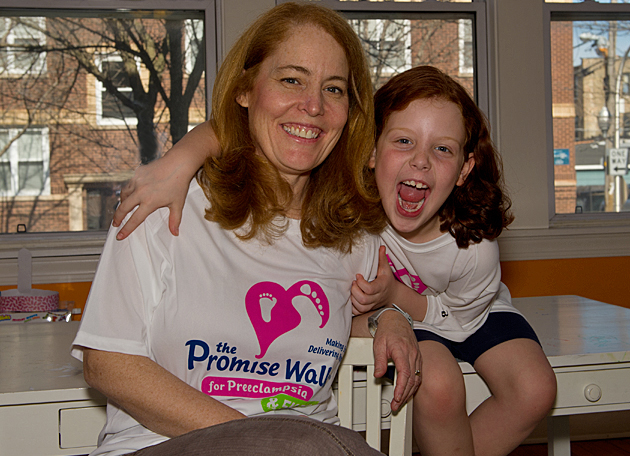
In October 2004, Jill Owens Siegel, MArch ’92, was enjoying what she thought was a normal pregnancy. Her body was swelling, but she thought that was to be expected a few months before her due date. Siegel soon learned the cause was preeclampsia, a dangerous condition in which hypertension arises during pregnancy. Her rapidly deteriorating health necessitated an emergency C-section 10 weeks early to deliver her daughter, Brooklyn. Siegel then developed a severe form of preeclampsia called HELLP syndrome and suffered a stroke, cerebral bleeding, and liver and kidney problems. Although she and her daughter are doing fine today, Siegel had a long road to recovery.
Preeclampsia threw her life off course. After being in a coma for nine days, Siegel had to learn to walk and talk again. She remained at the hospital for three months while her husband, Jeff, took care of Brooklyn. “I was unable to share the traditional bonding moments between mother and baby,” Siegel says. Her rehabilitation regimen, though, readied her for the physical demands of motherhood. She carried a weighted Cabbage Patch Kids doll and practiced standing up, eventually while holding the doll. In March 2005, Siegel returned home excited but nervous about having “the safety net of the hospital taken away from me.”
“More formal recognition can only help raise awareness,” enabling doctors to monitor the mother’s condition earlier. “I’ve heard so many stories with horrible outcomes because people didn’t know or found out too late, or their doctor discounted the symptoms they were experiencing.”
—Jill Owens Siegel
By summer, when she’d reached the point at which “the doctors were not so interested in me anymore,” her rehabilitation ended. Still weak, Siegel didn’t feel completely healed. She signed up for the 2006 New York Marathon, “a goal for myself so that I could feel as if I’d recovered.”
As the marathon neared, Siegel wasn’t sure she’d be able to complete the race. A volunteer workshop about the Preeclampsia Foundation turned things around. She learned that she didn’t cause her preeclampsia — “I’d been carrying around a lot of guilt,” she says — and met other preeclampsia survivors. “I decided to make the race a fundraiser for the organization,” Siegel says. “It took my training to a different level emotionally and enabled others in the recovery network to support me.”
After the marathon, Siegel continued working with the foundation. She edited its newsletter, spearheading its transition to an electronic format, and spoke at the 2007 Saving Grace Gala. Despite a demanding job in urban planning, she chaired the 2009 gala and the 2010 inaugural Chicago Promise Walk. These fundraisers raised more than $200,000 for the foundation. Due to her hard work, passion and leadership skills, Siegel received the foundation’s 2010 Hope Award, which honors an outstanding volunteer.
About the honor, Siegel is appreciative, but modest. “So many volunteers are trying to raise awareness,” she says. “There’s so much more to do, and so much more I’d like to do. You almost feel as if you’re not worthy.”
Shortly after the 2010 Promise Walk, Siegel left her job as an urban planner “to be there … as a mom” when Brooklyn entered kindergarten. She did consulting work and got a fundraising position at Brooklyn’s school. “This opportunity was a really happy coincidence,” she says.
Still serving as a volunteer with the Preeclampsia Foundation, Siegel is race director for the 2012 Chicago Promise Walk & 5K Run. She’s also involved in the foundation’s initiative to name May “Preeclampsia Awareness Month” on the national health calendar. “More formal recognition can only help raise awareness,” she says, enabling doctors to monitor the mother’s condition earlier. “I’ve heard so many stories with horrible outcomes because people didn’t know or found out too late, or their doctor discounted the symptoms they were experiencing.”
Siegel credits her “invaluable” Washington University education for helping her in her life’s work, even though she doesn’t use her architecture degree anymore. “It was an education of ideas,” she says, “which is translatable to so many things. The university gave me a wonderful gift.”
For more information on preeclampsia and HELLP syndrome, visit www.preeclampsia.org. To learn more about the Chicago Promise Walk, contact Siegel at jill.siegel@preeclampsia.org or visit www.chicagopromisewalk.org.
Beth Herstein, AB ’83, is a freelance writer based in Brooklyn, N.Y.
The editors recently learned that university staff member Jennifer Killion is serving as co-coordinator for the first St. Louis Promise Walk for Preeclampsia on May 12. To learn more, visit www.promisewalk.org.
Comments and respectful dialogue are encouraged, but content will be moderated. Please, no personal attacks, obscenity or profanity, selling of commercial products, or endorsements of political candidates or positions. We reserve the right to remove any inappropriate comments. We also cannot address individual medical concerns or provide medical advice in this forum.